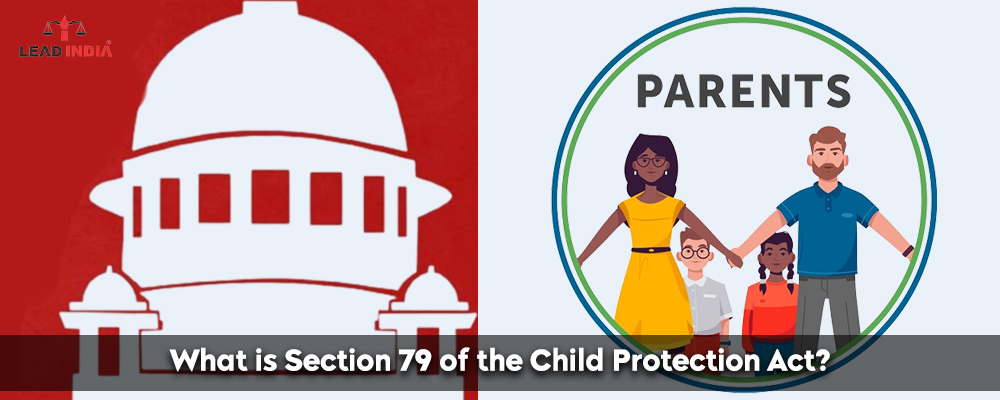A vital legislative framework created to guarantee the welfare and protection of children in conflict with the law is the Juvenile Justice (Care and Protection of Children) Act, which was passed in 2000. Section 79 of this extensive statute is very important as it outlines the guidelines and practices for the social integration and rehabilitation of young individuals.
Juvenile Justice Act: About
The Juvenile Justice Act, originally promulgated in 1986, underwent a significant amendment in 2000 to align with international standards, particularly the United Nations Convention on the Rights of the Child (UNCRC). The primary objective of the Act is to recognize the special needs and vulnerabilities of children in conflict with the law, emphasizing their rehabilitation and reintegration into society.
Need A Legal Advice
The internet is not a lawyer and neither are you. Talk to a real lawyer about your legal issue

Section 79 of Juvenile Justice Act
Section 79 of the Juvenile Justice Act serves as a linchpin for the rehabilitation and social reintegration of juveniles in conflict with the law. It delineates the principles that guide authorities in formulating rehabilitation programs, focusing on the overall development and well-being of the juvenile offenders.
- Section 79 emphasizes the formulation of individualized care plans for each juvenile, taking into account their specific needs, age, gender, and the nature of the offense. This provision is in consonance with the principle of individualized justice, recognizing the unique circumstances of each juvenile offender.
- The Act underscores the need for rehabilitation programs that cater to the educational, vocational, and skill development needs of juveniles. By providing them with opportunities for learning and acquiring skills, the legislation aims to equip juveniles with the tools necessary for a constructive and law-abiding life post-release.
- Section 79 envisions community participation in the rehabilitation process. It recognizes the role of the community in fostering a supportive environment for the reintegration of juveniles. This involvement is vital for reducing stigma and facilitating the acceptance of juveniles back into society.
- The Act mandates the use of non-stigmatizing language in all documents and interactions concerning juvenile offenders. This provision is crucial in promoting a positive and inclusive approach, refraining from labelling juveniles in a manner that could hinder their reintegration into society.
- Section 79 emphasizes the provision of aftercare support to juveniles’ post-release. This includes continuous monitoring, counselling, and support services to ensure a smooth transition into society. Aftercare is crucial for preventing recidivism and promoting the long-term well-being of juvenile offenders.
- Recognizing the developmental stages of juveniles, Section 79 advocates for age-appropriate interventions. This includes tailoring rehabilitation programs to suit the cognitive and emotional capacities of juveniles at different ages, ensuring that interventions are effective and meaningful.
- The Act stresses the importance of monitoring and evaluating rehabilitation programs to assess their efficacy. Regular reviews and assessments are essential to make necessary adjustments and improvements in the rehabilitation strategies employed for juvenile offenders.
Challenges Faced
- While Section 79 embodies progressive principles for the rehabilitation of juvenile offenders, there are certain challenges and criticisms that need to be acknowledged. One notable concern is the lack of uniform implementation across different states and regions. Disparities in resources, infrastructure, and awareness often result in varying standards of rehabilitation programs, impacting the effectiveness of Section 79.
- Another criticism revolves around the limited emphasis on mental health support within the Act. Juveniles in conflict with the law may often have underlying mental health issues that require specialized attention. The absence of a robust mental health framework in Section 79 raises questions about the comprehensiveness of rehabilitation efforts.
- Additionally, the aftercare component, while recognized in the legislation, faces challenges in implementation. Limited resources and the absence of a structured aftercare system in many regions hinder the successful reintegration of juveniles into society.
Fostering collaboration among government agencies, civil society, and the public at large is crucial in ensuring that rehabilitation concepts are applied consistently and uniformly. Furthermore, a more equitable and empathetic juvenile justice system in India will be made possible by ongoing assessment and improvement of rehabilitation programs, with an emphasis on mental health care in particular.
One can talk to a lawyer from Lead India for any kind of legal support. In India, free legal advice online can be obtained at Lead India. Along with receiving free legal advice online, one can also ask questions to the experts online free through Lead India.





 Talk to a Lawyer
Talk to a Lawyer